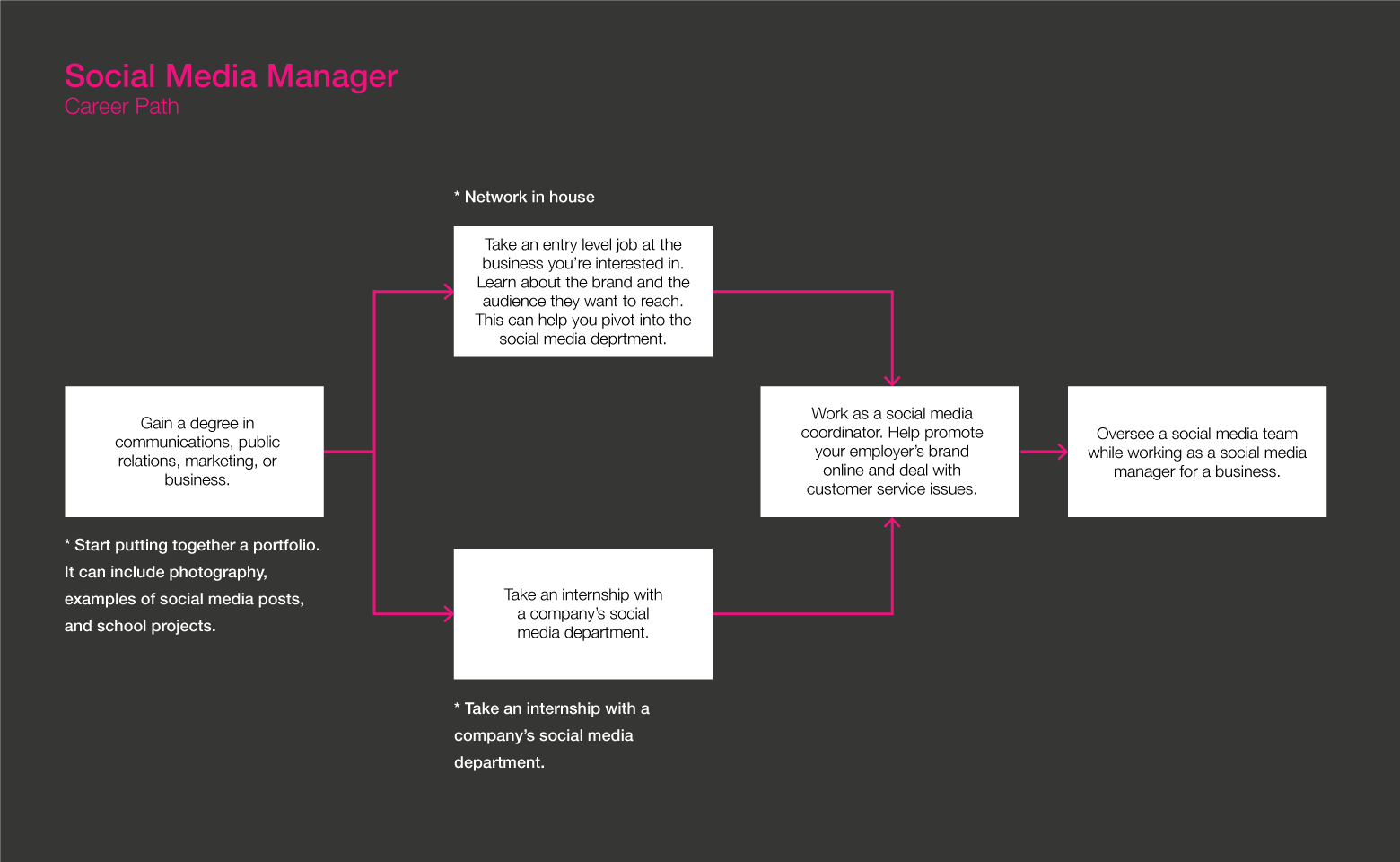الاضواء
Social Media Coordinator, Social Media Manager, Social Media Producer, Social Media Strategist, Digital Engagement Specialist, Online Community Manager, Digital Marketing Specialist, Social Media Marketer, Social Media Analyst, Content Creator, Influencer Marketing Specialist, Brand Ambassador
Social media specialists work on the overall social media strategies for a business or organization. They communicate with the public through social media platforms such as Facebook, Twitter and Instagram. Solving customer service issues and promoting their employer’s brand online are all part of the day to day work of a social media specialist.
- Seeing the excitement one of your posts can create online
- Helping customers expand their message, mission, or brand
- Checking posts from the day before to see what worked and what didn’t work
- Check what’s trending online and see if you can play into it
- Working on campaigns to promote the company’s brand
- Writing and scheduling posts
- Creating graphics
- Running ads
- Replying to fans
- Dealing with customer service issues (if freelance)
- Copywriting
- Design: graphics and video
- Knowing how to tell a story using elements such as photos and video
- Customer service/community engagement
- Behavioral psychology
- Working with analytics
- Social media management software (i.e. Hootsuite)
- Budgeting
As social media use grows, more companies are looking for social media specialists to promote and manage their brand online. Social media specialists can find employment in a wide variety of organizations.
The biggest trend right now is video. Social media platforms like Facebook and Instagram are pushing video through features such as live streaming.
- There is no set degree path for becoming a Social Media Specialist. Many hold bachelor’s degrees in communications, public relations, business, marketing, digital media, or design. Some may go for an MBA to qualify for higher-paying jobs
- Some students sign up for digital marketing bootcamps to knock out their main academic requirements in a shorter period. A few options include:
- Harvard’s Digital Marketing Strategy
- Udacity Digital Marketing Course
- General Assembly Online Digital Marketing
- Knowledge of social platforms and social media management principles is essential
- Popular social apps and sites include TikTok, YouTube, Facebook, Instagram, Pinterest, LinkedIn, Snapchat, Twitter, WhatsApp, Telegram, Reddit, and Quora
- Social Media Specialists should understand their employers’ products, services, and target customer avatars. They also need to know how each social platform is best utilized to communicate messages
- Common college courses may include English, writing, storytelling, graphic design, mass communication, social media marketing strategy, social media campaigns, digital advertising, writing for new media, business, math, finance, and virtual environments
- There are several tech tools you may need to learn about for campaign management, such as CoSchedule, Hootsuite, Feedly, Airtable, and TweetDeck. General knowledge of design software like Adobe Photoshop or Illustrator is also helpful
- Stats and analytical programs are also essential tools to become comfortable using, such as BuzzSumo, NodeXL, HubSpot, Sprout Social, Google Analytics, and Tapinfluence
- Stock up on courses in English, creative writing, psychology, storytelling, art, graphic design, audiovisual technology, and digital media
- Tap into your creativity and find unique ways to translate ideas into shareable content
- Practice your social media skills by launching practice sites and channels. Pay attention to what gets viewed, shared, or commented on (versus what doesn’t)
- Learn from success! Study viral social media ads, videos, and copywriting to see what works. Try to figure out “why” it works for the intended audience and how they created it
- Read or watch tutorials on the built-in features of applicable apps and platforms. If you can’t figure something out, ask others on discussion boards
- Take online courses (via Coursera, Constant Contact, Skillshare, HubSpot Academy, Google Digital Garage, or Wordstream) to master skills beyond the basics, such as using software to edit videos and add audio, special effects, and other enhancements
- Get familiar with analytical tools and software that can display user engagement stats
- Create freelancer accounts on sites like Upwork or Fiverr to gain practice experience working with clients
- Build an awesome Social Media Specialist portfolio to hook potential employers!
- Social media trends move fast, so keep up and try to get ahead of the curve
- Volunteer to do social media jobs at your school and apply for Social Media internships
- Keep up with the social media trends. Listen to podcasts or subscribe to SmartBrief for Social Business.
- Don’t fall behind. Social media changes every day; apps like Snapchat are always updating. Stay on top of how popular social media platforms work but don’t just use them to post selfies! Think of how you could use them to promote a business.
- Try to land internships that focus on working with a company’s social media team
- See if your university has anything to offer; some schools have social media jobs for students. Helping run your school’s Instagram account will help you work on your skills and build your portfolio of work.

- Social Media Specialists need to have a demonstrable background in using social sites to engage audiences. This may require unpaid practice but can pay off in the end.
- In some cases, recruiters may reach out to you. They often scout for talent on sites like LinkedIn, Facebook, Twitter, and Instagram
- Once you have a portfolio of work to show off, start looking for internships or jobs on Indeed, Simply Hired, Glassdoor, or other job portals. If needed, work as a freelancer on sites like Upwork, Guru, Freelancer, Hubstaff Talent, or Fiverr until you land a big client…or a motivated startup company you can grow with!
- Acadium is another resource for training and job seeking
- If attending college, ask your school’s career center for help connecting with potential employers
- Be your own client! Put your social media skills to work on your behalf and advertise your availability!
- Reach out to local businesses or marketing agencies that you think could benefit from your services. Don’t be afraid to do some cold pitches. Enough small accounts could tide you over until you find a full-time position
- Stay connected with professors, supervisors, and clients who can serve as professional references
- Check out Social Media Specialist resume templates and interview questions
- Being well rounded. A social media manager’s tasks include photography, marketing, customer service, web production, design and analytics all while considering the legality of what you’re putting up online.
- Must know social media platforms inside and out.
- Be and stay curious!
المواقع الإلكترونية
- Acadium
- Airtable
- Airtable's Content Calendar
- BuzzSumo
- CoSchedule
- Feedly
- Gary Vaynerchuck (blog)
- Google Analytics
- Hootsuite
- هبسبوت
- HubSpot Marketing Blog
- Neil Patel (blog)
- NodeXL
- Quora
- Scott Monty
- Snapchat
- Social Media Examiner
- Social Media Explorer
- Social Media Today
- Sprout Social
- Tapinfluence
- TikTok
- TweetDeck
- YouTube
الكتب
- Social Media Marketing All-in-One For Dummies, by Michelle Krasniak
- Social Media Marketing for Small Business 2022, by Kelly Lee, Tom Brooks, et al.
- 500 Social Media Marketing Tips: Essential Advice, Hints and Strategy for Business: Facebook, Twitter, Instagram, Pinterest, LinkedIn, YouTube, Snapchat, and More!, by Andrew Macarthy
eBooks
- Public Relations Officer
- Digital Marketer
ملف الأخبار

وظائف مميزة

الدورات والأدوات عبر الإنترنت








